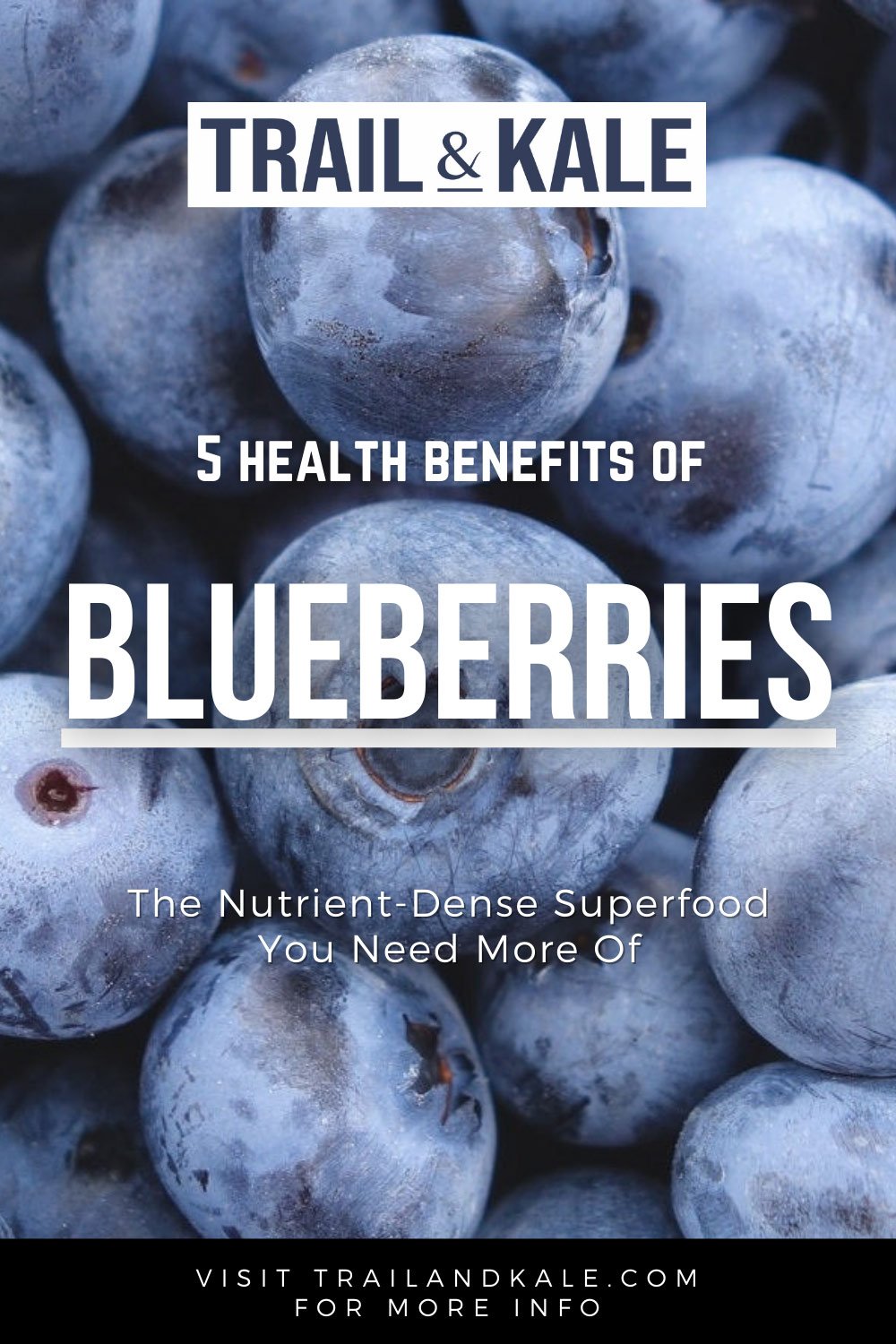Here at Trail & Kale, we are always on the lookout for nutrient-packed foods that not only taste great but also provide a wealth of health benefits. One such superfood is the humble blueberry, a small but mighty berry that is bursting with vitamins, minerals, and antioxidants.
In this post, I will discuss the incredible health benefits of blueberries and share some delicious recipes for you to try. This comprehensive guide aims to provide you with everything you need to know about blueberries and their role in promoting optimal health.
5 Top Health Benefits of Blueberries: Antioxidant Powerhouses and More

1. High in Antioxidants
Blueberries are a powerful source of antioxidants, including vitamin C, vitamin E, and anthocyanins. Antioxidants help neutralize harmful free radicals, which can cause cellular damage and contribute to aging, inflammation, and chronic diseases like cancer and heart disease.
By consuming antioxidant-rich foods like blueberries, you can support your body’s natural defenses against these harmful substances.
As an avid runner and lover of the great outdoors, I appreciate how blueberries can help reduce inflammation, which is essential for a smart, active recovery routine – and one of the reasons they’re one of my favorite fruits to eat and put into recovery and breakfast smoothies!
2. Supports Heart Health
Blueberries contain various nutrients and flavonoids that contribute to heart health. These berries may help lower cholesterol, reduce blood pressure, and prevent blood clotting.
Consuming blueberries may also help improve insulin sensitivity, which can lower the risk of type 2 diabetes and metabolic syndrome, both linked to heart disease.
3. Boosts Brain Health
The anthocyanins in blueberries have been shown to support brain health. These potent antioxidants may help protect against age-related cognitive decline, improve memory, and promote overall mental well-being.
Regular consumption of blueberries can help keep your brain sharp and functioning optimally.
4. Improves Eye Health
Blueberries are rich in antioxidants that help protect the eyes from age-related diseases like macular degeneration and cataracts. Including blueberries in your diet may help maintain good vision and promote overall eye health.
5. Supports Bone Health
Blueberries are an excellent source of vitamin K, which is crucial for maintaining strong bones and preventing osteoporosis. Vitamin K works with other nutrients like calcium and magnesium to ensure optimal bone health.
Blueberries’ high levels of these essential minerals further contribute to their bone-boosting properties.
Types of Blueberries: A Guide to the Different Varieties
Blueberries are delicious and nutritious berries enjoyed worldwide for their sweet taste and health benefits and they come in various types, each with unique characteristics and flavors. Here’s a guide to some popular blueberry varieties:
Highbush blueberries
Highbush blueberries are the most common variety found in grocery stores and gardens. They grow on tall bushes and produce large, plump berries with a sweet, juicy flavor. Highbush blueberries are further divided into Northern Highbush and Southern Highbush varieties, each adapted to specific growing regions.
Lowbush blueberries (also known as wild blueberries)
Lowbush blueberries grow on shorter bushes and produce smaller berries than highbush varieties. These blueberries have a more intense, tangy flavor and are often used in jams, jellies, and baked goods. Wild blueberries are rich in antioxidants and are commonly found in the northeastern United States and eastern Canada.
Rabbiteye blueberries
This variety is native to the southeastern United States and gets its name from the pinkish-white color of the unripe berries, which resemble a rabbit’s eye. Rabbiteye blueberries are heat-tolerant and produce medium to large-sized berries with a sweet, slightly tart flavor.
Half-high blueberries
Half-high blueberries are a hybrid between highbush and lowbush varieties, combining the best traits of both. They grow on medium-sized bushes and produce large, flavorful berries. Half-high blueberries are cold-tolerant and well-suited for northern climates.
Bilberries
Though not technically a blueberry variety, bilberries are closely related to blueberries and share many similarities. Bilberries are native to Europe and produce small, dark blue berries with a tart, slightly astringent flavor. They are often used in European cuisine for making pies, jams, and liqueurs.
When choosing which type of blueberries to grow or enjoy in your recipes, consider the flavor profile and growing requirements you prefer. Each variety has its unique taste and characteristics, making blueberries a versatile and delightful addition to your garden or kitchen.
Blueberries Raw or Cooked: Which Provides the Most Nutritional Benefits?
Both raw and cooked blueberries offer unique health benefits. Raw blueberries retain more of their vitamin C content, which supports a healthy immune system.
Cooking blueberries, on the other hand, can make certain nutrients, such as their antioxidant content, more easily absorbed by the body.
Including both raw and cooked versions of blueberries in your diet can help you maximize their health benefits.
Blueberry Nutrition Facts: A Closer Look
One cup of blueberries provides an abundance of essential nutrients with very few calories. Blueberries are an excellent source of vitamin K, vitamin C, vitamin E, and manganese.
They also contain significant amounts of dietary fiber, potassium, and vitamin B6.
The health benefits of blueberries is widely known and underpinned by a growing body of scientific evidence, and so incorporating blueberries into your meals can help ensure that you’re getting a wide range of nutrients necessary for optimal health.
Nutritional Information
Here is the nutritional information (including vitamins and minerals) for 100g of blueberries, which is approximately 2/3 cup of fresh blueberries:
- Calories: 57
- Carbohydrates: 14.5 g
- Fiber: 2.4 g, 10% Daily Value (DV)
- Protein: 0.7 g
- Fat: 0.3 g
- Vitamin C: 9.7 mg, 16% DV
- Vitamin K: 19.3 mcg, 24% DV
- Vitamin E: 0.6 mg, 3% DV
- Manganese: 0.3 mg, 17% DV
Blueberries are packed with vitamins, minerals, and antioxidants, making them an essential part of a healthy diet. One serving of blueberries contains significant amounts of vitamin C, vitamin K, and manganese.
The antioxidants in blueberries, particularly anthocyanin, a flavonoid, give them their deep blue color and are responsible for many of their health benefits.
How to Incorporate Blueberries into Your Diet

With their incredible health benefits and delicious taste, it’s easy to include blueberries in your daily meals.
Here are some simple ways to incorporate this antioxidant-rich berry into your diet:
- Add blueberries to your morning smoothie for an extra boost of nutrients.
- Sprinkle fresh blueberries over yogurt, oatmeal, or cereal for a burst of flavor.
- Bake blueberries into muffins, pancakes, or bread for a tasty treat.
- Make a blueberry sauce for pancakes, waffles, or ice cream by simmering fresh or frozen blueberries with a bit of sugar and lemon juice.
- Toss blueberries into a fruit salad or mixed green salad for added color and nutrition.
Delicious Blueberry Recipes to Try Today
- Blueberry Banana Smoothie: Blend fresh or frozen blueberries, bananas, yogurt, and milk for a refreshing and nutritious smoothie.
- Blueberry Chia Pudding: Mix blueberries with chia seeds, milk, and a sweetener of your choice, then refrigerate overnight for a healthy and tasty breakfast or snack.
- Blueberry Quinoa Salad: Combine cooked quinoa, blueberries, feta cheese, and your choice of greens, then toss with a light vinaigrette for a unique and flavorful salad.
- Blueberry Overnight Oats: Combine oats, milk, yogurt, chia seeds, and blueberries in a jar or container, then refrigerate overnight for an easy and nutritious breakfast option.
- Blueberry Crumble: Combine blueberries with a crumbly topping made of flour, sugar, and butter, then bake until golden and bubbly for a delicious dessert.
How to Select and Store Blueberries
When selecting blueberries, look for plump, firm berries with a uniform blue color and a slightly frosty appearance. Avoid berries that are soft, shriveled, or have mold.
To store fresh blueberries, place them in a covered container in the refrigerator. They should last for up to a week.
If you choose to buy frozen blueberries, ensure that they are free of added sugars or preservatives.
Side Effects of Eating Too Many Blueberries
While blueberries are generally healthy, consuming excessive amounts may lead to side effects such as gastrointestinal discomfort, due to their high fiber content.
Moderation is key to enjoying the health benefits of blueberries without negative consequences.
Can Dogs Eat Blueberries?
If you’re a regular reader of Trail & Kale, then you’ll know we love adventuring with our dog Kepler, and as we care about him so much, we are always researching whether or not it is safe for him to eat certain foods (he would eat most things given the opportunity).
I know many of you have a furry friend at home too, so this section is for you guys! 🙂
Blueberries are safe for dogs to eat in moderation. They are a healthy, low-calorie treat packed with vitamins and antioxidants that can provide some of the same health benefits for your canine companion as they do for you. However, it is important not to overfeed blueberries to your dog, as too many can cause digestive upset.
Always consult with your veterinarian before introducing new foods into your dog’s diet.




